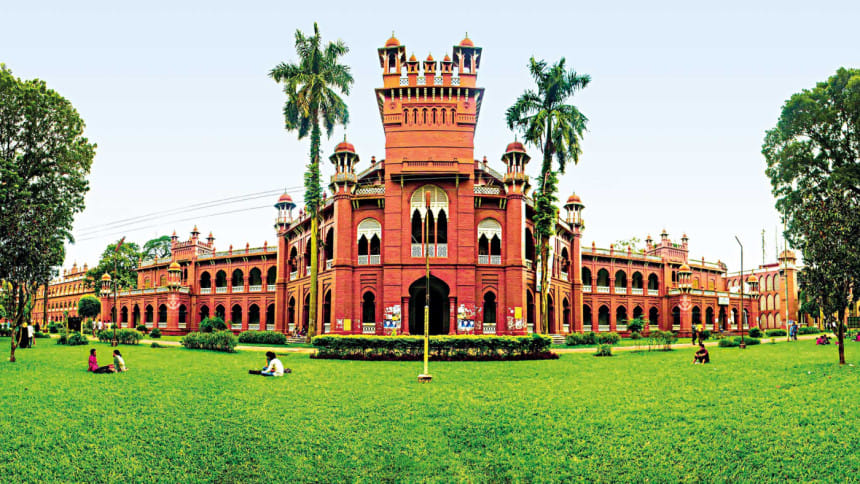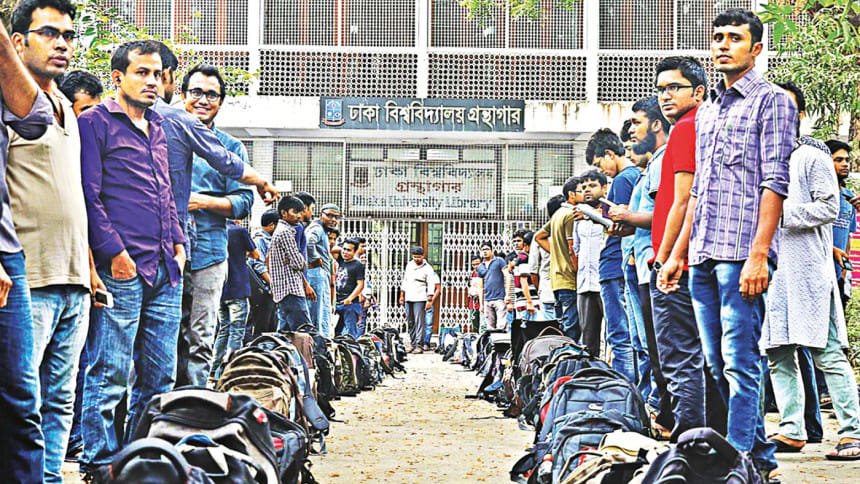University of Dhaka: The Trillion Dollar Opportunity Cost

People usually tend to believe that there were universities in ancient India or Arabia. Some claim that the crusaders brought the idea of the university from the Middle East to Europe. In my view, these are total misconceptions. Plato and Aristotle had each found their academies in Athens. There were famous educational institutions in Taxila and Nalanda in India and huge madrasas in Arabia. These institutions may have been similar to or even bigger than the universities of today, but none was in fact a university.
University is a particular type of institution that was created in the latter half of the Middle-ages (1000-1500) in Europe due to specific socio-politico-economic conditions that existed nowhere in the world at that time or earlier. A new class of bourgeois started to form during that period of time and they tried to cocoon themselves by forming guilds which were called universities in the then Latin. There were universities of barbers, potters, smiths, students, and teachers.
Later, the meaning of the word university got narrowed to denote 'organization of students' in Italy and 'organization of teachers' in Paris. During the 11-12th century, there were two different models of university, the Bologna model and the Paris model, of which only the latter survived. In the Paris model, students were admitted to the affiliated colleges. The college administration constituted of the Provost, the Dean, the Proctor, the House tutors, and of course, the teachers. Colleges were responsible for education whereas the university's responsibility was to organize the examinations and confer degrees on the successful students.

The democracy that flourished in Europe during the Greco-Roman period was forgotten since the fall of the western Roman empire. All through the Middle Ages and Renaissance, until the French Revolution and even after, the people of Europe were under despotic rule whereas all guilds including universities were run according to the democratic principles since their inception.
Universities are believed to have shaped the fate of the West by shaping its mind through the Middle Ages and Renaissance followed by the Industrial Revolution and the modern time. Whatever sign of modernity and progress we notice around us today, would be a direct or indirect consequence of the knowledge created by or through the universities.
The English, after conquering the subcontinent, established in the 19th century, universities to control and shape the mindset of the educated natives, the white men's burden, as they used to call us. For some reason, they decided to implement the Oxford model at the University of Dhaka (Henceforth DU).
To date, DU students are admitted into a hall that is relics of the colleges of Paris or Oxford. They pass the exam and get a degree as a student of a particular hall. Each hall is run by a group of house tutors headed by a Provost. DU is called Oxford of the East because of this similarity in structure between the two institutions.
Although de jure, DU is an autonomous institution, de facto it is controlled by the political leaders in power. The vice-chancellors and deans of DU are elected, but, surprisingly, as soon as the government changes, the DU vice-chancellor is replaced followed by other important officials. However, no matter who is in power, DU halls remain overpopulated, toilets dirty, and food in the canteens unappetizing as always. Beds and floors are shared and some students even sleep in the corridor contiguous to the toilets. The so-called common rooms accommodate as many students as possible.
The permission to pass the night in these common rooms is almost like a ticket to heaven for a poor sophomore from a remote village, who, to get this ticket, has to join the student group that supports the party in power, take part in manifestations organized by student leaders, and shout slogans be it at cold midnight in December or at burning noon in July. However, once settled, these students consider themselves brahmins and students of the affiliated colleges, outcasts. They do not even let the latter step into the university buses, as if those untouchables will impure their sacred chariots!

As in Paris or Oxford in the Middle Ages, clashes among the different factions of students are not unheard of in DU or other public universities. DU and other public universities become the arena where the government-supported student groups show off their muscle power, who at times do not hesitate to assault physically even the teachers. However, when the government changes, the same tigers leave the DU area secretly at night like miserable cats not to come back soon.
Bangladeshi people who usually love to feel proud are disheartened every year to see not a single university in their country ranked among the first five hundred or thousand universities. But the universities alone should not be blamed for it. If we compare the education system with a pyramid, primary and secondary education would form its base, and universities its tip. If the base is weak, the tip can seldom be strong.
The main difference between a college teacher and the one teaching at some university is that the former may do research whereas the latter must. Universities are supposed to contribute to the sustainable development of the country. 'The research can show us the way!' The prime minister has recently emphasized research in different domains. Unfortunately, not much research is done presently at DU and only a tiny fraction of the national/university's budget is allotted to research activities.
Unlike in Western universities, the teaching staff of DU is constituted of her own brilliant graduates, but the brilliance of result is seldom the guarantee of excellence in teaching and competence in research. A small fraction of the DU recruits become good teachers by chance, and a smaller fraction of them become competent researchers by choice.
Urban upper-middle-class is not interested anymore in getting admitted to DU, because they, unlike their parents, seldom consider DU a prestigious institution. This is reflected in the fact that protagonists of TV dramas or serials nowadays do not study at DU but in some private university that has a campus as modern and beautiful as those in the West.
Rural middle-class students, finding no other alternative, choose DU, because admission to DU allows them to stay in the capital for a couple of years, and earn a couple of thousand takas per month by giving tuition. They are not interested in learning but in having a degree in a subject they seem to dislike the most, be Pali, Sanskrit, or World religion... because this piece of paper will allow them to sit for civil service entrance examinations. DU library is full of readers who rather than reading books are busy memorizing the civil service examination guides like a flock of parrots.

As most of the administrators and intellectuals of Bangladesh are DU graduates, the authorities of DU love to believe that the country is run by DU. I have heard a DU vice-chancellor claim DU to be the only university in the history of mankind that has given birth to a nation. Another vice-chancellor said that he is not interested in the ranking because no ranking criteria can measure the kind of knowledge DU graduates may acquire only by gossiping with each other in the TSC area.
DU cannot be compared with Oxford or Harvard because Bangladesh is not comparable with England or USA. However, if international quality can be ensured in the Padma bridge, then why the quality of education at DU would not be as good as at Oxford? If the government does not mind tripling the budget of a bridge that links two different parts of the country, then why is it reluctant to increase the budget for education and research that may link the country with its bright future?
Bangladesh, a former British colony, exploited to the extreme during the 18-20th century, is still being exploited by the West, the pied-piper of Hamelin, who attracts her youngsters to get the so-called higher education by paying exorbitant tuition fees. When countries like Sri Lanka are suffering from a lack of tourists due to pandemics or economic crises, educational tourism is going in full swing in the West.
Authorities in Bangladesh put emphasis on infrastructure and they do it rightly. But investing in education has a much deeper and more permanent impact on the future of the nation. They do not realize that universities could be a lucrative source of income for centuries to come. 'But the blunder is more serious!' says Rik Bhattacharja, a Montreal-based Bangladeshi-Canadian free thinker and writer. "If Bangladesh does not take the development of the universities seriously, there will be two types of opportunity costs. The country is losing money in tuition fees every year, but that's easily calculable. Let's say, 100,000 Bangladeshi students are currently studying abroad and they spend, on average, 50 thousand US dollars per year on tuition and living expenses. The total expense would amount to 5 billion US dollars, which is more than the budget of the Padma bridge!

But there is another compound opportunity cost that is not easily calculable. By not modernising DU or other universities we are depriving the nation of proper incentives and a nurturing as well as a stimulating environment for creative people, free thinkers, pioneer researchers, and ground-breaking mavericks. The affluent rich who are leaving Bangladesh could have invested their financial and intellectual capital in the country. Those who are sadly obliged to stay back, we are also depriving them of the proper education or the proper opportunity.
In the long run, we end up wasting the time, talent, and interest of all those who could have given the nation a better industry, better educational institutions, better administration, and finally, a better society. In a period of ten years, the nation is in fact losing a couple of trillions, in cash and also in kind, amounting to the cost of a couple of Padma bridges, Ruppur power plants, or Bangabandhu satellites.
DU could have contributed to the reduction of the drainage of intellect and capital by transforming and optimising itself for the better and setting the standard for other universities or institutions in the country. DU should reflect on a detailed 50-year plan stating how it would like to transform itself into an intellectual fertile ground where new ideas would flourish.
Bangladesh is a rising economy but one must also rise socially, industrially, and intellectually. The grim alternative of not taking such necessary steps is to condemn this young nation to a plateau of mediocrity. A stitch in time saves nine, and we, whether a university or a nation, are responsible for our choices because they determine our destiny. In a volatile global economy where tensions are high among powerful nations, we cannot afford to remain shortsighted and indulgent. If the university had shaped the fate of the West for a thousand years, they would definitely do the same for us."
The problem of DU as well as other public and private universities in Bangladesh is part of the overall problems of education in Bangladesh and only a holistic approach can do the miracle. Unless the authorities become as serious with modernizing the education as it was with constructing the Padma bridge, the sustainable development of this country may remain a mirage forever.
Shishir Bhattacharja is a Professor at the Institute of Modern Languages, University of Dhaka.

 For all latest news, follow The Daily Star's Google News channel.
For all latest news, follow The Daily Star's Google News channel. 








Comments